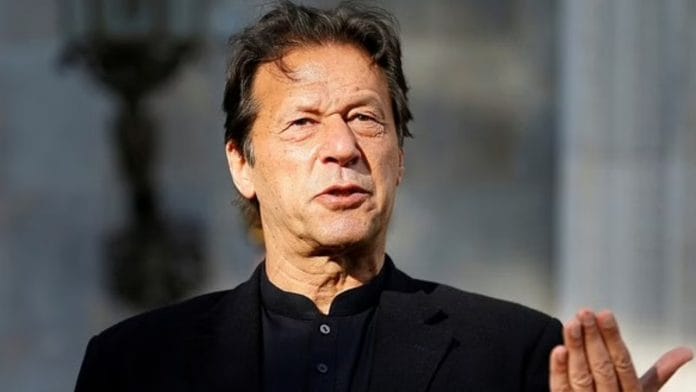New Delhi: Pakistan’s beleaguered Prime Minister Imran Khan on Wednesday cancelled an address to the nation amid whispers that he may resign ahead of the no-confidence vote this week.
An important ally of Khan’s Pakistan Tehreek-e-Insaf (PTI) ruling coalition, the MQM-P, jumped ship last night, reducing the government to a minority.
Given the reduced numbers, it is unlikely Khan will survive the no-confidence vote moved by the opposition. It will be taken up for debate Thursday.
Leader of the Opposition and President of the Pakistan Muslim League-Nawaz (PML-N), Shahbaz Sharif, introduced the vote of no-confidence Monday in the National Assembly.
Propped up by allies, Imran Khan’s PTI-led coalition has a razor-thin edge of 179 members in the Lower House which needs a minimum of 172 in a total of 342.
However, after key ally and main coalition partner Muttahida Qaumi Movement Pakistan (MQM) struck a deal with the opposition, Khan is left with 164 members. His own party has 155.
Major opposition constituent, Pakistan People’s Party chairman Bilawal Bhutto Zardari, tweeted: “The united opposition and MQM have reached an agreement. Rabta committee MQM and PPP CEC will ratify the said agreement. We will then share details with the media in a press conference tomorrow IA. Congratulations Pakistan.” The joint opposition now has 177 members in the National Assembly.
Bilawal said the opposition would “settle the matter” in the voting tomorrow. “We can then start working on transparent elections and the journey towards restoration of democracy and an end to economic crisis can then begin,” he said.
The PPP leader also said former prime minister Nawaz Sharif’s brother Shahbaz Sharif would be the new prime minister of Pakistan.
The Pakistan army chief and the head of the Inter-Services Intelligence met Khan on Wednesday.
Khan also summoned a special session of the cabinet Wednesday after reports that two ministers belonging to the MQM-P had already resigned.
Sources said the latest political situation would be discussed with the objective to win back the lawmakers belonging to MQM-P and another ally, the Balochistan Awami Party (BAP).
BAP announced on Monday that it had “accepted the opposition’s invitation” to vote against Khan.
Before the cabinet meeting, Khan got some support from colleague and minister Fawad Chaudhry who tweeted: “Imran Khan is a player who fights till the last ball. There will not be a resignation. There will be a match, both friends and foes will watch it.”
Khan has also said there was a “foreign conspiracy” to topple his government. He brandished a letter at a party rally, which he said contained evidence of this conspiracy.
Pakistan plunged into uncertainty on March 8 after the combined opposition submitted the motion with the National Assembly, which will convene on Thursday to debate the motion.
Khan has ordered his party members to stay away from the House on voting day to prevent any chances of his own men defecting.
Khan faces a rebellion within his party too.
According to the Constitution, Imran Khan does not need to win. He just needs to ensure that the opposition does not get 172 votes.
If Khan loses the vote, Parliament can function till its term ends in August 2023. A new Prime Minister will be chosen to serve until then. Any party can put forward a candidate. The new prime minister can also call a general election immediately.
No prime minister in Pakistan’s history has ever been ousted through a no-confidence motion, and Khan is the third premier to face the challenge.
No Pakistani prime minister has ever completed a full five-year term in office either.
Khan came to power in 2018 with promises to create a ‘Naya Pakistan’ but failed to address the basic problems of keeping prices of commodities in control.
Also read: ‘International migraine’: With Imran on brink, recalling what Madeleine Albright called Pakistan






